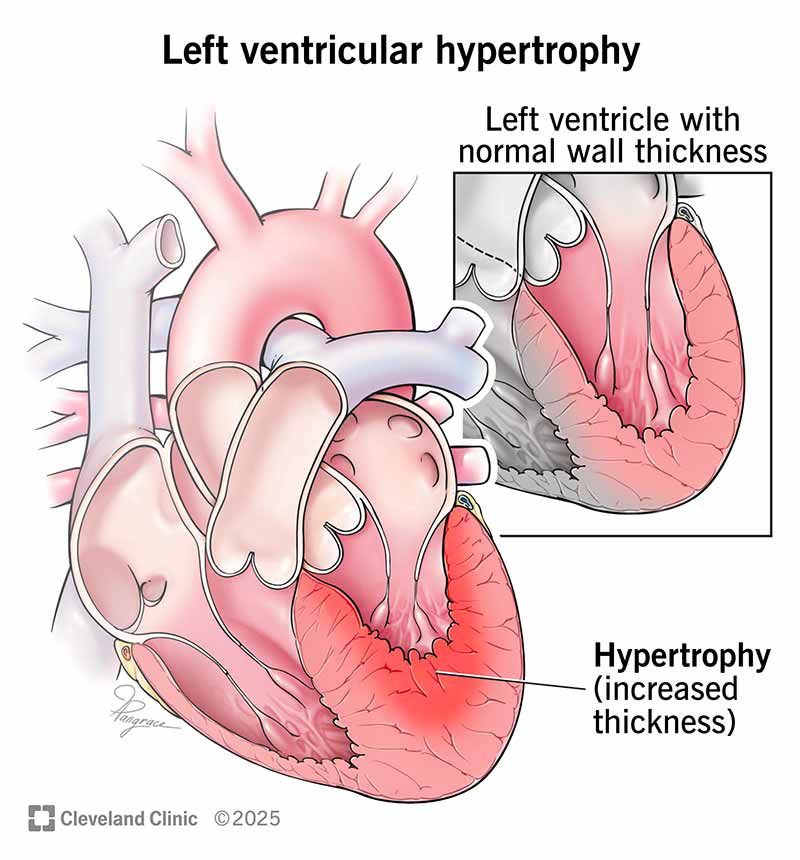Left ventricular hypertrophy is thickening of the walls of the left ventricle, your heart’s main pumping chamber. This happens because of high blood pressure or volume. Thicker walls in your left ventricle can interfere with its ability to pump blood into your aorta. This major artery sends oxygenated blood all through your body.
Advertisement
Cleveland Clinic is a non-profit academic medical center. Advertising on our site helps support our mission. We do not endorse non-Cleveland Clinic products or services. Policy

Image content: This image is available to view online.
View image online (https://my.clevelandclinic.org/-/scassets/images/org/health/articles/21883-left-ventricular-hypertrophy-illustration)
Left ventricular hypertrophy (LVH) is a thickening of muscles in the walls of your lower left heart chamber. This happens when your heart works too hard to pump against high pressure and a large volume of blood. Your left ventricle can also stretch out when it’s handling too much blood.
Advertisement
Cleveland Clinic is a non-profit academic medical center. Advertising on our site helps support our mission. We do not endorse non-Cleveland Clinic products or services. Policy
Your left ventricle has the vital job of pumping oxygen-rich blood into your aorta (your largest artery). From there, blood goes all throughout your body.
LVH, an enlarged left ventricle, can happen when your heart tries to keep up with the demands on it. The condition affects nearly 1 in 5 people.
To describe your condition, healthcare providers look at the size of your left ventricle and the thickness of its walls. Types of left ventricular hypertrophy are:
With mild left ventricular hypertrophy, you may not notice any symptoms. As the condition gets worse, you may have LVH symptoms that include:
There are many different diseases and conditions that may cause LVH. The most common cause of left ventricular hypertrophy is high blood pressure (hypertension). High blood pressure makes your heart work harder than normal. The extra work it takes to pump blood can make the muscle in your left ventricle walls get larger and thicker.
Advertisement
Intense athletic training can sometimes lead to an increase in the size and thickness of your left ventricle walls. But in most cases, athletes’ hearts still function normally and don’t need treatment.
Other conditions that can lead to LVH include:
You may have a higher risk of LVH if you have:
You may also be at a higher risk of an enlarged left ventricle if you use tobacco products, eat a lot of salt and don’t get much physical activity.
Other heart issues usually lead to left ventricular hypertrophy. Together, they can raise your risk of serious complications. Left untreated, LVH affects your heart’s ability to pump blood efficiently. These changes increase your risk of other issues, including:
Even if you aren’t having symptoms of LVH, your healthcare provider may find it during a routine heart screening. Because there are many different causes for LVH, your cardiologist may order different tests to rule out these conditions.
Tests providers use to diagnose left ventricular hypertrophy include:
Treating the cause of LVH will help stop or slow disease progression. Depending on the cause, you may need to change your daily habits, take medicine or have surgery.
Advertisement
Left ventricular hypertrophy treatment may include:
You should call your healthcare provider if you experience:
You may want to ask your healthcare provider:
Advertisement
Left ventricular hypertrophy can get better or worse. Studies have shown that LVH can improve — and even reverse — when you lower your blood pressure. Other factors come into play, though. If you’ve had high blood pressure a long time and have obesity, you may not be able to reverse LVH.
You may be able to live a normal life with LVH if you can manage the condition that caused it. Life expectancy with left ventricular hypertrophy is different from person to person. You may have many other conditions that stress your heart compared to someone who doesn’t. Your provider is the best person to help you understand what you can expect.
Left untreated, LVH (and related underlying heart conditions) increases your risk of serious heart disease or even death. Treatment to slow or stop the progression of left ventricular hypertrophy lowers the risk of severe heart damage. An early and accurate diagnosis is the key to improving the outlook for people with left ventricular hypertrophy.
If you have a heart condition that could lead to LVH, catching and treating it early can make a big difference. Treatment can help prevent left ventricular hypertrophy from developing. It can also reduce the risk of damage to your heart muscle.
Advertisement
Preventing or managing high blood pressure is the best way to prevent left ventricular hypertrophy. In addition to taking any medications your healthcare provider prescribes, you can:
You may be surprised to learn that you have left ventricular hypertrophy. But finding it before it causes symptoms is a good thing. It means you can treat it before it gets worse. Even if you have symptoms, you can treat LVH. Ask your healthcare provider what steps you can take to treat this condition and improve your heart health.

Sign up for our Health Essentials emails for expert guidance on nutrition, fitness, sleep, skin care and more.
Learn more about the Health Library and our editorial process.
Cleveland Clinic’s health articles are based on evidence-backed information and review by medical professionals to ensure accuracy, reliability and up-to-date clinical standards.
Cleveland Clinic’s health articles are based on evidence-backed information and review by medical professionals to ensure accuracy, reliability and up-to-date clinical standards.
When your heart needs some help, the cardiology experts at Cleveland Clinic are here for you. We diagnose and treat the full spectrum of cardiovascular diseases.
